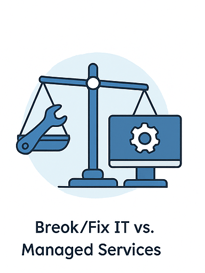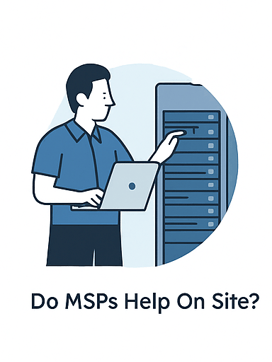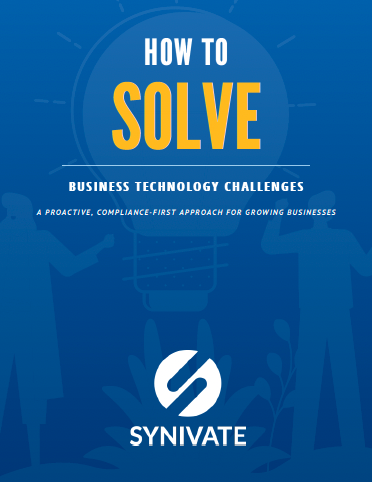Choosing the Right Managed IT Service Provider
IT isn't just about fixing problems. Download our e-book to learn more about Managed IT Services and how to choose a trusted Managed IT Service Provider for your small business.
We've worked with hundreds of organizations, completed hundreds of thousands of support requests and migrated over 30,000 workers into Microsoft Office 365. Take a look at our guide to learn more about the specifics of a Managed IT Service Provider and the services they offer.
-
Table of Contents
What is an MSP?
A Managed Service Provider (MSP) is a third-party company that proactively manages a business’s IT systems and infrastructure. Unlike traditional IT service models that rely on a break/fix approach, MSPs deliver a consistent level of service through ongoing support, monitoring, and management—usually under a flat monthly fee. MSPs offer a variety of services, such as remote help desk support, cybersecurity monitoring, patch management, data backup, disaster recovery, and strategic IT planning.
By partnering with an MSP, businesses can offload the day-to-day burden of IT operations to experts, freeing internal resources to focus on business-critical activities. MSPs are ideal for small to medium-sized businesses (SMBs) that lack the resources for a fully-staffed, in-house IT department but still require enterprise-level IT capabilities and protection. Jump to Top of Page
How is an MSP Different from an IT Vendor or IT Consultant?
An MSP is a long-term, full-service partner responsible for managing and optimizing your entire IT environment, while IT vendors and consultants typically serve short-term or specific-use roles.
-
IT Vendors usually sell and support specific products—like networking equipment, software licenses, or hardware solutions—but don’t manage those systems long-term.
-
IT Consultants offer expert advice, often on a project-by-project basis, such as migrating to the cloud or implementing new cybersecurity protocols. They don’t maintain responsibility after the project ends.
-
MSPs, on the other hand, continuously monitor, update, and optimize systems while offering strategic guidance. Their value lies in their ability to anticipate issues, deliver 24/7 support, and build IT roadmaps tailored to your business growth. Jump to Top of Page
What is Break/Fix IT Services vs. Managed Services?
Break/fix IT support is a reactive model where businesses only call for technical help when something goes wrong—think of it as calling a repairman when your server crashes. This model can result in unexpected expenses, long downtimes, and missed warning signs that could have prevented the issue.
In contrast, Managed Services are proactive. An MSP monitors your systems 24/7, identifies potential issues before they become problems, and implements fixes automatically. This approach reduces the chance of costly failures and creates predictable IT spending. It also allows businesses to scale more efficiently, as they can rely on consistent support without adding internal headcount. Jump to Top of Page
Why Would I Need an MSP vs. Just an IT Consultant?
An IT consultant provides expertise and recommendations—usually for a specific project or short-term engagement. While this can be useful for one-off challenges, it lacks the ongoing management and support many businesses need.
An MSP not only advises but also implements and maintains solutions. This includes:
-
Monitoring systems around the clock
-
Applying patches and updates
-
Responding to incidents in real time
-
Strategically planning IT investments over time
With an MSP, you gain a partner who not only understands your technology but aligns it with your business goals for the long term. It’s a relationship built on performance, accountability, and ongoing service—not one-time advice. Jump to Top of Page
What is Help Desk Support?
Help desk support is a frontline IT service that assists users with daily technical issues—whether it’s a password reset, a software error, or a printer not working. It’s typically the first line of defense when employees encounter an IT problem.
Help desks operated by MSPs often include tiered levels of support:
-
Tier 1: Basic support and troubleshooting (e.g., login problems)
-
Tier 2: Intermediate-level support involving technical issues
-
Tier 3: Escalation to senior engineers or specialists for complex problems
A reliable help desk reduces downtime and frustration, boosting productivity across your organization. MSPs usually offer multi-channel access (phone, email, portal, live chat) to ensure your team can get support quickly. Jump to Top of Page
What Are Typical Hours for Help Desk Support?
Help desk hours can vary based on the MSP’s service model, their locality and your agreement. Most MSPs offer standard business-hour support (typically 9:00 AM – 5:00 PM), give or take an hour on either end, with some extending to 24/7 support for businesses with mission-critical needs or global teams.
For industries like healthcare, finance, or logistics—where downtime can have significant consequences—24/7 help desk support is essential. MSPs often offer customized service level agreements (SLAs) that guarantee response times based on severity and time of day. Jump to Top of Page
Is Help Desk Support Typically Provided Remotely?
Yes, remote support is the default for most help desk services. Through secure remote access tools, technicians can troubleshoot issues directly on a user’s device without being physically present. This minimizes resolution time and increases flexibility.
Remote help desks also allow MSPs to centralize support, reduce overhead, and provide faster turnaround compared to on-site visits. However, in certain cases—such as hardware replacement or physical network troubleshooting—on-site support is still required and often available as part of your service agreement. Jump to Top of Page
Do MSPs Cover On-Site Support as Well?
Many MSPs offer a hybrid model that combines remote help desk support with on-site services when necessary. On-site support typically includes:
-
Hardware installations and replacements
-
Network wiring and infrastructure setup
-
Large-scale deployments or migrations
-
In-person troubleshooting for persistent issues
On-site support may be scheduled or included in your service plan as needed. Some MSPs offer fixed monthly visits, while others operate on an as-needed basis. Jump to Top of Page
What MSPs Typically Don't Help With
While MSPs cover a broad range of services, there are areas they typically don’t handle directly:
-
Custom software development: MSPs may manage the infrastructure, but application development is usually outside their scope. Some MSPs offer these services so be sure to ask.
-
Business process consulting: While they may advise on tools, MSPs aren’t focused on deep business workflows or operational strategy. Some MSPs have business consultants on-staff to help with this.
-
Non-IT-related support: Tasks outside the digital realm—such as office equipment maintenance—aren’t typically part of an MSP’s scope.
That said, many MSPs have partnerships or extended networks they can recommend for these specialized needs. Jump to Top of Page
Do MSPs Help with Compliance and Best Practice Alignment?
Yes, a growing number of MSPs offer compliance and regulatory alignment services. They help businesses meet standards like SOC 2, ISO 27001, HIPAA, and PCI-DSS by:
-
Performing IT risk assessments
-
Implementing necessary technical controls (e.g., encryption, logging)
-
Managing documentation and audit preparation
-
Ensuring access controls and user policies are enforced
MSPs also stay up to date on evolving regulations, helping your organization remain compliant as standards change. Jump to Top of Page
What is a vCIO as it Relates to Managed Services?
A vCIO (Virtual Chief Information Officer) is a strategic IT advisor provided by an MSP to help you plan and align your technology with business goals. Unlike a typical support technician, a vCIO:
-
Conducts quarterly business reviews (QBRs)

-
Helps create IT budgets and strategic roadmaps
-
Recommends technologies aligned with business outcomes
-
Advises on cybersecurity and compliance posture
This role turns your MSP relationship into a strategic partnership. The vCIO ensures IT doesn’t just function—it drives growth. Jump to Top of Page
How Do Managed Services Prevent Cybersecurity Breaches?
Managed services offer layered defenses to reduce the likelihood of a breach. MSPs monitor for unusual activity, apply security patches promptly, and use enterprise-grade tools to protect endpoints and networks. Key features include:
-
Firewall management
-
Antivirus/anti-malware
-
Intrusion detection/prevention
-
Log monitoring and alerting
By identifying vulnerabilities before they’re exploited, MSPs help businesses avoid costly incidents and maintain business continuity. Jump to Top of Page
How Do Managed Services Help Prevent Ransomware, Phishing, or BEC Attacks?
MSPs combat common threats like ransomware, phishing, and business email compromise (BEC) using a combination of technology and training:
-
Email filtering to block malicious attachments and links
-
Employee training to spot phishing attempts
-
Regular backups to restore systems quickly if an attack occurs
-
Endpoint detection and response (EDR) tools
-
Access controls to limit exposure
With an MSP, prevention becomes a continuous process—not a one-time fix. Jump to Top of Page
How Can Managed Services Increase Productivity in Small Businesses?
Technology is a productivity enabler—but only when it works. MSPs ensure systems run smoothly, allowing employees to focus on core tasks. They also introduce solutions that:
-
Automate manual workflows
-
Improve communication and collaboration
-
Reduce downtime and IT bottlenecks
-
Streamline device and software management
By aligning IT tools with business needs, MSPs help teams get more done, faster. Jump to Top of Page
Why Companies Working with Managed Services Providers Achieve Higher Growth, Productivity, and Less Risk
Companies that use MSPs enjoy:
-
Fewer disruptions and system outages
-
Predictable IT costs
-
Strategic technology planning
-
Improved cybersecurity insurance compliance
This combination leads to higher operational efficiency, lower risk, and a competitive edge. Studies show that businesses with proactive IT support scale faster and experience fewer compliance and security issues. Jump to Top of Page
You've Built a Great Business — Let Us Help Maintain That and Reduce Your Technology Risk
At Synivate, we understand the value you’ve built in your business. Our job is to protect it with reliable IT support, strong security practices, and forward-looking technology planning. Whether you’re growing or stabilizing, we’ll help you avoid the risks that could threaten your momentum. Jump to Top of Page
How MSPs Help with Projects on Digital Transformation
Digital transformation involves integrating technology into every part of your business. MSPs support this by:
-
Migrating infrastructure to the cloud
-
Replacing legacy systems with modern solutions
-
Automating workflows
-
Advising on SaaS and collaboration tools
Whether it’s launching a customer portal, enabling remote work, or modernizing your network, MSPs guide digital transformation from vision to execution. Jump to Top of Page
